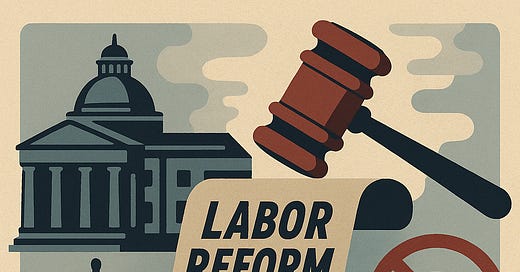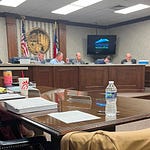A sweeping labor reform proposal in the North Carolina General Assembly is drawing both praise and alarm as lawmakers consider major changes to how the state handles workplace safety investigations, including what happens when a worker dies on the job.
The bill, HB568 “2025 Omnibus Labor Amendments,” aims to streamline the Department of Labor’s procedures by cutting red tape, shielding inspectors from frequent subpoenas, accelerating access to autopsy reports in fatal cases, and waiving public hearings when the state adopts federal OSHA rules verbatim.
Supporters say the reforms will help the agency focus on preventing workplace accidents instead of getting entangled in legal bureaucracy. But critics warn the bill could erode judicial fairness, limit public participation in rulemaking, and sideline workers and grieving families when they most need a voice.
“Just because a rule mirrors federal law doesn’t mean North Carolinians shouldn’t weigh in — especially if our state wants to provide stronger protections,” said Sen. Natasha Marcus (D-Mecklenburg), who raised concerns during a recent committee hearing.
Fast-Tracked Fatality Reports
Under current law, the Department of Labor is required to finalize its report within six months of a workplace death — a timeline that often runs out before the North Carolina Office of the Chief Medical Examiner can return a completed autopsy. That gap can leave families, employers, and insurers without critical facts.
The bill proposes a fix: allow the Labor Commissioner to request autopsy results within five months. That small shift could provide investigators with crucial information in time to shape the final report. Sen. Amy Galey (R-Alamance) provided more details at the judiciary committee yesterday.
“That’s so that employers and the families of the decedents can be treated more fairly and get a more prompt and accurate resolution,” Galey said during the meeting.
Courtroom Access at Risk?
One of the most contentious provisions would restrict the ability of lawyers to subpoena Department of Labor inspectors as witnesses in civil litigation, particularly in workers’ compensation or wrongful death cases.
Former state Supreme Court Justice Barbara Jackson, now the Labor department’s interim general counsel, stated that inspectors have been inundated with court demands.
“It does present a drag on the department,” Jackson said, noting that five or six subpoena requests crossed her desk in just a few weeks.
But opponents, including Sen. Sydney Batch (D-Wake), argued that removing live testimony from the courtroom could deny injured workers or their families the ability to question those who created the official records.
“Some of these cases are very significant and important,” Batch said. “I would hate for cross-examination of that witness not to be allowed and justice not be served.”
To ease those concerns, the bill permits investigative reports to be entered as evidence — but without witnesses, critics say, the public may lose a crucial check on government authority.
Silencing the Public?
A section of the bill would allow the Department of Labor to skip public hearings when adopting OSHA rules that are identical to federal standards. Galey called the change a “common-sense efficiency” move. But Marcus and other Democrats argued that it cuts off an important venue for state-specific concerns.
“Sometimes there may be folks who want to argue for greater protection,” Marcus said. “This will cut off the opportunity to have as robust a discussion as we ought to have.”
Jackson clarified that North Carolina can still choose to exceed federal standards, but when mirroring federal rules, the department could bypass extra procedural steps.
Still, with workplace safety often depending on local context — from heat protections in agriculture to construction site regulations — some lawmakers worry this shortcut will sideline communities.
Uneven Playing Field?
The bill also proposes new rules for the discovery process during appeals to the Occupational Safety and Health Review Commission, a federal entity, where businesses can contest safety citations. Under current law, discovery is extremely limited.
“The Occupational Safety and Health Review Commission (OSHRC) is an independent agency created by Congress in the Occupational Safety and Health Act of 1970. The agency’s primary function is to decide contests of citations or penalties that the Occupational Safety and Health Administration (OSHA) issues to employers following safety and health inspections of American workplaces. In doing so, the agency provides OSHA, employers, and employees and/or their representative with a fair and expeditious resolution of these contested cases,” their website said. “OSHRC is a completely independent agency that is not part of the Department of Labor or OSHA. This ensures that OSHA’s enforcement actions are carried out in accordance with the law.”
The proposed state bill would give respondents — usually businesses — the right to request full discovery. That idea was broadly welcomed. But several senators questioned why the bill doesn’t also grant the Department of Labor the same right.
“If we’re all taking a bite out of the same apple, that’s probably for the best,” Jackson said, suggesting the language may still be revised.
Why It Matters for Every North Carolinian
The scope of the proposal goes far beyond paperwork. At stake are fundamental rights: the right to a transparent investigation when someone dies at work, the right to question government findings in court, and the right to speak up when new safety rules are written.
There are over 100,000 workplaces in North Carolina, but only about 100 state compliance officers. In such a stretched system, even small changes to procedure can have outsized consequences.
Grieving families, often navigating trauma and legal uncertainty, may not have access to full facts under a compressed autopsy deadline. Workers trying to strengthen safety protections may lose the opportunity to comment. And attorneys seeking justice may find themselves unable to confront the officials whose reports drive court decisions.
At the same time, the bill includes good-faith efforts to improve fairness and efficiency. Faster autopsy results could make reports more accurate. Allowing investigative reports to be used as evidence could reduce unnecessary court costs. And expanding discovery for businesses might ensure they aren’t unfairly penalized.
The Road Ahead
The bill passed the committee today and will move on to the Rules and Operations of the Senate.
Opinion & Analysis: Cops & Congress Commentary
Why this shouldn’t fly under the radar
This is a moment that demands attention. It’s precisely the kind of legislation that rarely makes front-page news — filled with procedural language, legal nuance, and administrative jargon. But it affects us all.
When someone dies at work, their family deserves more than a rushed report. When safety standards are adopted, workers and advocates deserve to be heard. And when a report enters court, all parties deserve the right to ask questions and get answers.
Bills like these often pass quietly, without sustained scrutiny. That’s why Lake Lure News and Cops & Congress are committed to following not just the votes, but the voices that shape them. We track the details others miss — and we rely on our readers to help us keep digging.
Transparency isn’t optional when lives and safety are on the line. Your subscription helps ensure these stories don’t go untold.
—
© Lake Lure News / Cops & Congress
Reporting by Annie Dance. First published June 4, 2025. This article is an exclusive, no other outlets were known to be covering this bill at press time.












Share this post